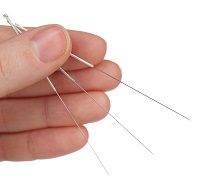Patient with a Painful Sore Throat? Try Needles in the Ear
Study results suggest that auricular acupuncture can be used to treat sore throat pain. The study also measured time lost to work with and without the acupuncture procedure, but the results for lost productivity did not meet statistical significance.

A study in the Journal of the American Board of Family Medicine suggests that auricular acupuncture can be used to treat sore throat pain. The study also measured time lost to work with and without the acupuncture procedure, but the results for lost productivity did not meet statistical significance.
While relatively minor clinically, acute sore throat resulting from upper respiratory infections is the cause of up to 15 million doctor visits per year in the United States alone. Home remedies and over-the-counter lozenges are often used to treat acute sore throat. But so, too, are nonsteroidal anti-inflammatory drugs (NSAIDs), which can be associated with gastrointestinal bleeding, renal failure, and other serious adverse events. While those complications would be unlikely for the short duration of treating acute sore throat, the researchers believe there is potential applicability of their findings for longer-term pain conditions.
Auricular acupuncture stimulates specific points on the ear and has been tried for treatment of many forms of pain. Mechanisms for its effectiveness are thought to relate to the inhibition of neurotransmitters and inflammatory markers such as substance P and interleukins, as well as the release of endogenous opioids. “Studies using functional magnetic resonance imaging and positive electron tomography also show that specific areas of the brain relating to pain sensation are either stimulated or inhibited when auricular acupuncture needles are in place,” the researchers note.
The current study tested battlefield acupuncture (BFA) in an unblinded, pragmatic, randomized controlled trial among adult, nonpregnant patients presenting to an Air Force family medicine clinic with pain from acute sore throat. A small sample size of 54 patients were followed for 48 hours after treatment.
Patients receiving auricular acupuncture reported lower pain scores than those who did not at 15 minutes (6.0 [95% confidence interval (CI), 5.4—6.6] vs 2.6 [95% CI, 1.7–3.5]; P < .0001), 6 hours (4.8 [95% CI, 4.0—5.6] vs 2.5 [95% CI, 1.6–3.4]; P = .0005), and 24 hours (4.1 [95% CI, 3.3—4.9] vs 1.3 [95% CI, 1.0–2.8]; P = .0006). They also reported taking fewer cumulative doses of pain medication at all time intervals measured. There was no difference in time missed from work between the auricular acupuncture and standard therapy groups.
“This study adds to the general body of evidence that auricular acupuncture is an efficacious treatment, and it specifically indicates that BFA, as a protocol, may be effective at reducing pain from a common cause in the outpatient clinic,” the researchers concluded. “Prolonged pain relief with acupuncture is beneficial for multiple reasons, and future research may include pain syndromes with a longer natural history, such as physical trauma or postsurgical pain.”
Study limitations include the small sample size and the lack of a “sham” acupuncture group, though the latter was by design.